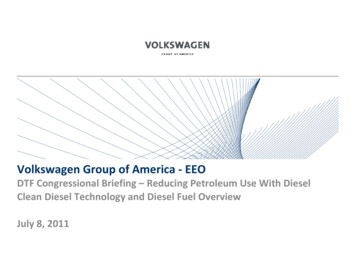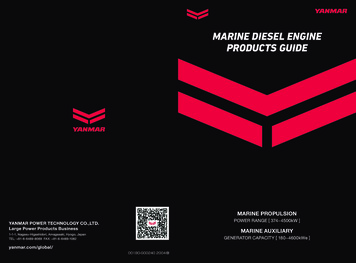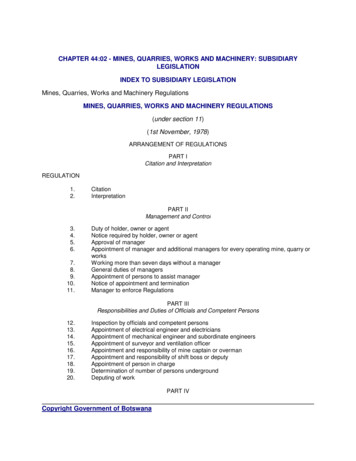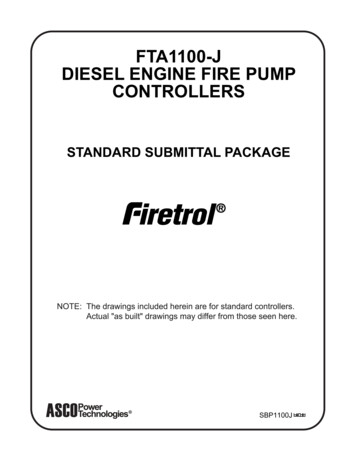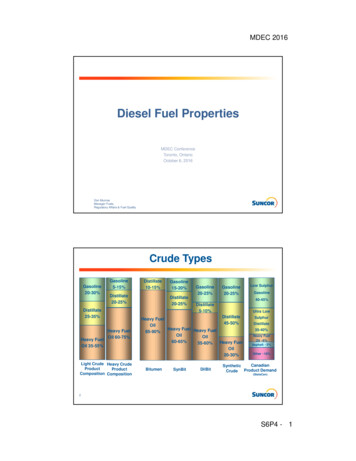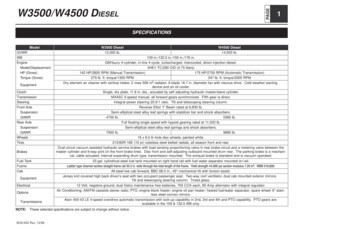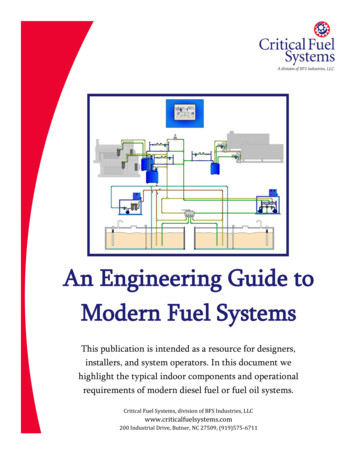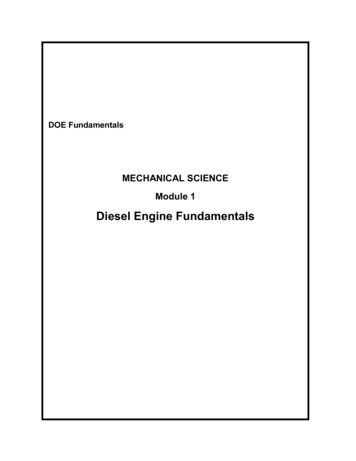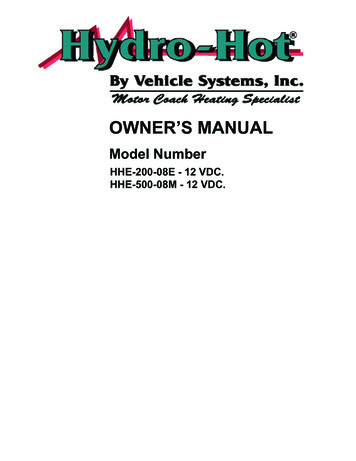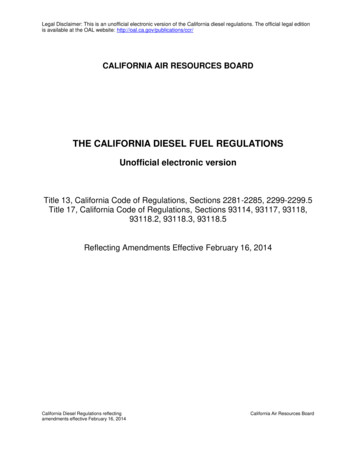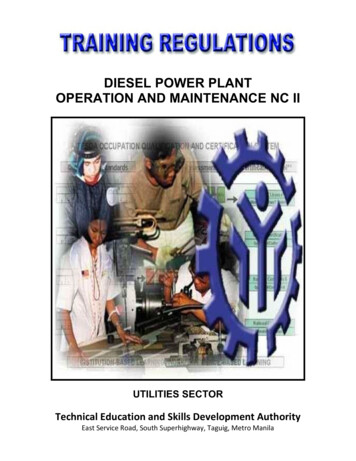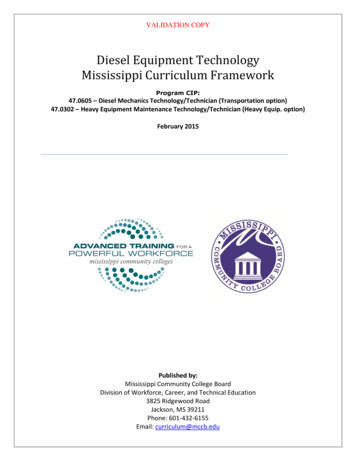
Transcription
VALIDATION COPYDiesel Equipment TechnologyMississippi Curriculum FrameworkProgram CIP:47.0605 – Diesel Mechanics Technology/Technician (Transportation option)47.0302 – Heavy Equipment Maintenance Technology/Technician (Heavy Equip. option)February 2015Published by:FACULTY WRITING TMississippiEAM MEMBERSCommunity College BoardAustin Cain, Coahoma Community CollegeDivision ofWorkforce,Career, and Technical EducationBlake Oberschmidt, Copiah-LincolnCommunityCollege3825 Ridgewood RoadGreg Holekamp, East Central Community CollegeDale Henry, East Mississippi Community CollegeJackson, MS 39211Phone:601-432-6155FACULTY WRITING TEAM MEMBERSSteven Esch, Copiah-Lincoln CommunityEmail:College curriculum@mccb.edu1
VALIDATION COPYDale Henry, East Mississippi Community CollegeTim Lamb, East Mississippi Community CollegeBrent Johnson, Hinds Community CollegeJason Gholston, Itawamba Community CollegeBarry Bradshaw, Jones County Junior CollegeBen Pratt, Northeast Mississippi Community CollegeKevin Bennett, Southwest Mississippi Community CollegeADMINISTRATOR WRITING TEAM MEMBERSBrent Duguid, Assistant Dean of Career/Technical Education,Copiah-Lincoln Community College, WessonJoe Cook, Assistant Dean of Career/Technical Education,East Mississippi Community CollegeDr. Joyce Jenkins, Dean of Career/Technical Education; Assistant District Director for Occupational Programs,Hinds Community College-RaymondDr. Chad Stock, Assoc. Dean of Career/Technical Education; Assoc. Vice President of Workforce Training,Hinds Community College-RaymondJeremy Kent Smith, Vice President for Career/Technical Education,Southwest Mississippi Community CollegeBUSINESS AND INDUSTRY WRITING TEAM MEMBERSJerry Swanson, Owner, Empire Truck & Stribling Equipment, Jackson, MSBob Bullard, Empire Truck, Jackson, MSBradly Cade, Empire Truck, Jackson, MSDanny Bales, Technical Services Manager, Puckett Machinery, Jackson, MSJoel Thomas, Stribling Equipment, Jackson, MSMickey Williams, Stribling Equipment, Jackson, MSChris Rowan, Product Support Training Manager, Thompson Machinery, Tupelo, MSDennis Vander Molen, President, Vermeer MidSouth, Inc., Jackson, MSOFFICE OF CURRICULUM AND INSTRUCTION TEAM MEMBERSAngela Bryan, Director of Curriculum and Instruction,Mississippi Community College BoardElmira Ratliff, Curriculum Specialist, Office of Curriculum and Instruction,Mississippi Community College BoardRachel M. De Vaughan, Curriculum Specialist, Office of Curriculum and Instruction,Mississippi Community College Board2
VALIDATION COPYThe Office of Curriculum and Instruction (OCI) was founded in 2013 under the Division of Workforce, Career, andTechnical Education at the Mississippi Community College Board (MCCB). The office is funded through apartnership with The Mississippi Department of Education (MDE), who serves as Mississippi’s fiscal agent for stateand federal Career and Technical Education (CTE) Funds. The OCI is tasked with developing statewide CTEcurriculum, programming, and professional development designed to meet the local and statewide economicdemand. Copyright 2015 by Mississippi Community College BoardFor information, please contact curriculum@mccb.edu.3
VALIDATION COPYCONTENTSRESEARCH ABSTRACT . 6RECENT REVISION HISTORY : . 6ADOPTION OF NATIONAL CERTIFICATION STANDARDS . 7ARTICULATION . 10TECHNICAL SKILLS ASSESSMENT . 10ONLINE AND BLENDED LEARNING OPPORTUNITIES . 10INSTRUCTIONAL STRATEGIES . 10ASSESSMENT STRATEGIES . 10CREDIT BY EXAMINATION . 10PROGRAM DESCRIPTION . 11SUGGESTED COURSE SEQUENCE . 12Accelerated Transition Pathway . 12Career Certificate Required Courses. 12Technical Certificate Required Courses (Transportation Option). 13General Education Core Courses . 14Technical Electives . 15CAREER CERTIFICATE REQUIRED COURSES . 16DET 1114Fundamentals of Equipment Mechanics . 16DET 1223Electrical/Electronic Systems I . 20DET 1263Electrical/Electronic Systems II . 23DET 1364Diesel Systems I. 26DET 1374Diesel Systems II. 28DET 1513Hydraulics I . 31DET 1614Preventive Maintenance and Service . 33DET 1713Transportation Power Train . 37DET 1813Air Conditioning and Heating Systems . 40DET 2623Advanced Brake Systems (Air) . 45TECHNICAL CERTIFICATE REQUIRED COURSES . 49DET 2253Steering and Suspension Systems . 49DET 2273Electrical/Electronic Systems III . 53DET 2383Diesel Systems III—Compare to Preventive Maintenance & DS II. 55DET 2513Hydraulic/Hydrostats II . 57DET 2523Heavy Equipment Power Trains . 60TECHNICAL ELECTIVE COURSES . 63DET 1213Hydraulic Brake Systems . 634
VALIDATION COPYDET 2113DET 291(1-6)Welding for Diesel Equipment Technology . 66Special Problem/Projects in Diesel Equipment Technology . 67DET 292(1-6) Supervised Work Experience in Diesel Equipment Technology. 68WBL 191(1-3), WBL 192(1-3), WBL 193(1-3), WBL 291(1-3), WBL 292(1-3), and WBL 293(1-3) WorkBased Learning I, II, III, IV, V, and VI . 70RECOMMENDED TOOLS AND E QUIPMENT . 71RECOMMENDED INSTRUCTIONAL AIDS. 74CURRICULUM DEFINITIONS AND TERMS . 755
VALIDATION COPYRESEARCH ABSTRACTThe curriculum framework in this document reflects these changes in the workplace and a number of other factorsthat impact local vocational–technical programs. Federal and state legislation calls for articulation between highschool and community college programs, integration of academic and vocational skills, and the development ofsequential courses of study that provide students with the optimum educational path for achieving successfulemployment. National skills standards, developed by industry groups and sponsored by the U.S. Department ofEducation and Labor, provide vocational educators with the expectations of employers across the United States.All of these factors are reflected in the framework found in this document.This curriculum was revised in 2007, but the last validated and approved revision of this curriculum took place in2011. In the fall of 2014 and spring of 2015, the Office of Curriculum and Instruction (OCI) met with severaldifferent business and industries in Central MS, Northern MS and Southern MS. An industry questionnaire wasused to gather feedback concerning the trends and needs, both current and future, of their field. Industrymembers stated the curriculum was strong, but wanted to encourage students who complete the program tocontinue becoming certified in additional construction areas. Currently, there are some areas where students arebeing hired as part-time employees waiting on something full-time to open in the diesel equipment technologyfield. The Office of Curriculum and Instruction also met with advisory committee members who reiterated whatindustry had stated. There is a 6.71% increase in occupational demand at the regional level and a 5.63% increaseat the state level. Program faculty, administrators, and industry members were consulted regarding industryworkforce needs and trends.RECENT REVISION HISTORY:2007-Research & Curriculum Unit, Mississippi State University2011-Research & Curriculum Unit, Mississippi State University2015-Office of Curriculum & Instruction, Mississippi Community College Board6
VALIDATION COPYADOPTION OF NATIONAL CERTIFICATION STANDARDSThe Board of Trustees of the National Automotive Technicians Education Foundation (NATEF) is responsible foraccreditation of automotive (automobile, collision repair & refinish, medium/heavy truck) programs at secondaryand post-secondary levels. NATEF will grant accreditation to programs that comply with the evaluation procedure,meet established standards, and adhere to the policies in this document. Program accreditation is under the directsupervision of the NATEF Board of Trustees and such personnel designated or employed by NATEF.On January 1, 2011, NATEF assumed the role of accreditation of automotive programs as an extension of its role asthe evaluation organization with the family of organizations of the National Institute for Automotive ServiceExcellence (ASE). The ASE standards for automobile program certification were introduced in 1982. Standards forcollision repair & refinish programs were launched in 1989 and truck standards followed in 1992. NATEF’s role inthe process was to work with industry and education to update the standards on a regular basis and evaluateprograms against those standards. Based on a positive evaluation, programs were “certified” by ASE for a period offive (5) years.After a lengthy process that included discussions with industry, employers, and educators, NATEF conducted aseries of workshops and webinars to review the automobile standards. The ASE Student Certification offerscertification in Medium/Heavy Trucks.For more information related to implementing NATEF at your local campus, please visit http://www.natef.org.The Automobile Service Excellence (ASE) Student Certification test series for the 2014 NATEF Medium/HeavyTruck Program Standards is comprised of six examinations covering light vehicle diagnosis and repair. The task listsare simply lists of the tasks involved in the process of diagnosing and repairing problems in the various vehiclesystems. The tasks may also be thought of as competencies. Each question found in the tests is keyed to one ofthese tasks. The tasks are organized into content categories, and these content categories, along with the numberof questions included in each category, comprise the test specifications. Every form of the exams will be built tomeet these specifications.For more information related to implementing ASE Student Certification at your local campus, please visithttp://www.asestudentcertification.com.7
VALIDATION COPYADOPTION OF NATIONAL CERTIFICATION STANDARDSThe AED Foundation, through its committed industry volunteers, is improving the quality of the equipmentindustry's workforce by publishing and maintaining the "Standards for Construction Equipment Technology." Thegoal is to help post-secondary institutions prepare students with the knowledge and skills they need to embark onsuccessful careers as equipment service technicians. The contents are regularly reviewed and updated by The AEDFoundation's Technical Training Committee in response to changes in technology and learning requirements.Now in its eighth edition, this document is the result of voluntary efforts by technical experts in the constructionequipment industry. The project is sponsored by The AED Foundation and includes the participation of leadingconstruction equipment distributors, equipment manufacturers and post-secondary school faculty. The standardscover six areas that the industry considers most important for the training of entry-level technicians: ics/HydrostaticsPower TrainsDiesel EnginesAir Conditioning/HeatingEstablished in 1991, The AED Foundation is the educational affiliate of Associated Equipment Distributors (AED), aninternational association of the construction equipment industry representing over 700 independent distributor,manufacturer and related firms. AED was established in 1919. The National Center on Education and the Economy(NCEE), Washington, DC provided guidance for the development of the original standards. For more informationor for additional copies, contact:The AED Foundation600 Hunter Drive, Suite 220Oak Brook, IL 60523Phone: 630-574-0650Fax: 630-574-0132Permission to copy this document for personal use by business and educational personnel is granted by The AEDFoundation. This publication is available on-line at: http://www.aedfoundation.org http://www.aedworkforce.comFor more information related to implementing ASE Student Certification at your local campus, please spx?Site AED&WebCode HomePage8
VALIDATION COPYINDUSTRY JOB PROJECTION DATABus and truck mechanics and diesel engine specialists’ occupations require an education level of a postsecondarycareer and technical certificate. There is a 6.71% increase in occupational demand at the regional level and a 5.63%increase at the state level. Median annual income for diesel equipment technicians and mechanics is 33,633.60 atthe state level. A summary of occupational data from the State Workforce Investment Board Data Center isdisplayed below:Table 1: Education LevelProgram OccupationsEducation LevelBus and truck mechanics and diesel engine specialistPostsecondary Career and Technical AwardTable 2: Occupational OverviewRegion2010 Occupational Jobs2020 Occupational JobsTotal ChangeTotal % Change2010 Median Hourly Earnings2010 Median Annual EarningsAnnual OpeningsTable 3: Occupational BreakdownDescription2010JobsBus and truck mechanics anddiesel engine specialistsTOTALStateUnited States2218501669211417811126.71% 16.17 33,633.601122331195.63% 16.17 33,633.6011231980101304.57% 19.64 40,851.2010132020 JobsAnnualOpenings2010 HourlyEarnings1669178111 16.172010Annual Earnings2,080 Work Hours 33,633.601669178111 16.17 33,633.60Table 4: Occupational ChangeDescriptionBus and truck mechanics and diesel engine specialistsRegionalChange112Regional% Change6.71%State %Change5.63%National %Change4.57%9
VALIDATION COPYARTICULATIONBased on the complexity of the Diesel Equipment Technology, articulation will not be granted at the postsecondarylevel. Dual credit and partnerships are encouraged at the local level.TECHNICAL SKILLS ASSESSMENTStudents will be assessed using the Diesel Equipment Technology MS-CPAS2 test. All students will test after yearone of their program. A second test targeting the transportation option second year material or the heavyequipment option second year material will be administered to AAS track students upon completion of theirprogram.OrUpon completion of the transportation option of this program, students should be prepared to sit for the nationalor international assessment, ASE Student Certification Medium/Heavy Truck Assessment aligned with thiscurriculum or to take another alternative assessment approved by MCCB Office of Career and Technical Education.Refer to the MCCB site for the latest approved alternate assessments.ONLINE AND BLENDED LEARNING OPPORTUNITIESCourse content includes lecture and laboratory semester credit hours. Faculty members are encouraged to presentlecture related content to students in an online or blended learning environment. Training related to online andblended learning will be available to faculty members through the MS Community College Board.INSTRUCTIONAL STRATEGIESThe 2014 Medium/Heavy Truck ASE student certification task lists based on NATEF standards were adopted andprovide instructional strategies to faculty members implementing the curriculum. The Construction EquipmentTechnology Standards provided from the Associated Equipment Distributors were also included in the curriculumand provide instructional strategies to faculty members implementing the curriculum.ASSESSMENT STRATEGIESThe NATEF Standards were adopted for the 2014 Medium/Heavy Truck ASE Student Certification Task Lists, alongwith the Construction Equipment Technology Standards, provided by the Accredited Equipment Distributors, andprovide assessment strategies to faculty members implementing the curriculum. Additionally, performance taskswere included in course content when appropriate.CREDIT BY EXAMINATIONThe following ASE student certification areas are aligned to courses listed below. Each area will serve as the staterecommended exam to reward credit for prior learning experiences. Colleges have the local autonomy to create acollege-level exam when awarding credit. This challenge exam, written and skill based, agreement will be made atlocal institution.10
VALIDATION COPYPROGRAM DESCRIPTIONThe Diesel Equipment Technology Program is an instructional program that provides students with competenciesrequired to maintain and repair a variety of industrial diesel equipment, including agricultural tractors, commercialtrucks, and construction equipment. The program includes instruction in inspection, repair, and maintenance ofengines, power trains, hydraulic systems, and other components.Diesel Equipment Technology is an articulated certificate or technical program designed to provide advanced skillsto its students. Baseline competencies, taken from the secondary Diesel Service Technology, serve as a foundationfor the competencies and objectives taught in the courses of the program. Students who do not possess thesecompetencies will be allowed to acquire them during the program. Students who can document mastery of thesebaseline competencies will not be required to repeat these competencies.The program offers an accelerated transition pathway of 15 semester credit hours, a career certificate at 30semester credit hours, a technical certificate at 45 semester credit hours for transportation (medium to heavytrucks) option, a technical certificate at 45 semester credit hours for a heavy equipment option, and an Associateof Applied Science degree at 60 semester credit hours.The curriculum utilized both the Automotive Service Excellence (ASE) 2014 Medium/Heavy Truck standards andthe 2014 Standards for Construction Equipment Technology (AED). These documents serve as national standardsfor certification of medium/heavy truck and construction equipment technician programs.The tasks described in the document are based on a number of assumptions which also apply to the competenciesand objectives in the Career Technical courses of this program. These assumptions include:1. In all areas, appropriate theory, safety, and support instruction will be required in the performance of eachobjective including the identification and safe use of tools and testing and measuring equipment, and the use ofreference materials and technical manuals, whether electronic or paper-based.2. All diagnostic and repair tasks are performed in accordance with manufacturer’s recommended proceduresand to manufacturer’s specifications.National Automotive Technicians Education Foundation13505 Dulles Technology DriveHerndon, VA 22071-3415(702) 713-010Associated Equipment Distributors (Construction Equipment Technology)The AED Foundation600 Hunter Drive, Suite 220Oak Brook, IL60523Phone: 630-574-0650Fax: 630-574-013211
VALIDATION COPYSUGGESTED COURSE SEQUENCEAccelerated Transition PathwaySCHBreakdownCourseNumberDET 1114Course NameFundamentals of EquipmentMechanicsDET 1614SemesterCreditHoursLectureContact 30Preventive Maintenance and ationCertificationName15Career Certificate Required Contact ication*Electrical/Electronic Systems I322603030ASEDET 1513*Hydraulics I314751560DET 1364*Diesel Systems I*Preventive Maintenance andServiceElectrical/Electronic Systems II orTransportation Power 312/244/27590/601530/306060/30555255300DET 1114Course Name*Fundamentals of EquipmentMechanicsDET 1223DET 1614DET 1263 orDET 1713DET 1813DET 1374 orDET 2623*Air Conditioning and HeatingSystemsDiesel Systems II or Advanced BrakeSystemsApproved electives per Instructor atlocal community college levelTOTAL*These courses will be tested on MS-CPAS2.LectureLectureLab23012ASEASE (DET1263)ASE &Section 609Certification
VALIDATION COPYTechnical Certificate Required Courses (Transportation Option)SCHBreakdownSemesterCreditHoursContact ctHours14751560ASE332222606030303030ASE*Advanced Brake Systems (Air)322603030ASEInstructor Approved Electives3CourseNumberCourse NameDET 2273*Electrical/Electronic Systems III3DET 2253DET 1713*Steering and Suspension Systems*Transportation Power TrainDET 5 270*These courses will be tested on MS-CPAS2.Note: Courses required under the Transportation Option MAY be used as electives for the Heavy Equipment Option.Technical Certificate Required Courses (Heavy Equipment Option)SCHBreakdownCourseNumberDET 2273DET 2523DET 2513DET 2383Course Name*Electrical/Electronic Systems III*Heavy Equipment Power Train*Hydraulic/Hydrostats II*Diesel Systems IIISemesterCreditHoursInstructor Approved ElectivesTOTALContact ecture Lab HoursLecture Name60 ASE6030ASE30 ASE315270*These courses will be tested on MS-CPAS2.Note: Courses required under the Heavy Equipment Option MAY be used as electives for the Transportation Option.13
VALIDATION COPYGeneral Education Core CoursesTo receive the Associate of Applied Science Degree, a student must complete all of the required coursework foundin the Career Certificate option, Technical Certificate option and a minimum of 15 semester hours of GeneralEducation Core. The courses in the General Education Core may be spaced out over the entire length of theprogram so that students complete some academic and Career Technical courses each semester or providedprimarily within the last semester. Each community college will specify the actual courses that are required tomeet the General Education Core Requirements for the Associate of Applied Science Degree at their college. TheSouthern Association of Colleges and Schools (SACS) Commission on Colleges Standard 2.7.3 from the Principles ofAccreditation: Foundations for Quality Enhancement1 describes the general education core.Section 2.7.3In each undergraduate degree program, the institution requires the successful completion of ageneral education component at the collegiate level that (1) is substantial component of each undergraduatedegree, (2) ensures breadth of knowledge, and (3) is based on a coherent rationale. For degree completion inassociate programs, the component constitutes a minimum of 15 semester hours or the equivalent. These credithours are to be drawn from and include at least one course from the following areas: humanities/fine arts,social/behavioral sciences, and natural science/mathematics. The courses do not narrowly focus on those skills,techniques, and procedures specific to a particular occupation or profession.Academic Courses for Diesel Equipment TechnologySCH BreakdownCourseNumberCourse NameSemesterCreditHoursHumanities/Fine ArtsNatural Science/Mathematics(MAT 1313 College Algebra*)3Social/Behavioral SciencesOther academic courses perlocal community collegerequirements for AAS degree.3LectureLabTotalCreditHoursContact icationNameLab36TOTAL15*MAT 1233 Intermediate Algebra may be taken in lieu of MAT 1313 College Algebra; This Mathematicscourse can be College Algebra or higher (MAT 1713)1Southern Association of Colleges and Schools Commission on Colleges. (2012). The principles of accreditation:Foundations for quality enhancement. Retrieved editation.pdf14
VALIDATION COPYTechnical ElectivesSCH BreakdownCourseNumberCourse NameDET 1213Hydraulic BrakeSystemsDET 2383DET291(1-6)DET292(1-3)DET 2113DET L292(1-3)WBL293(1-3)Diesel Systems IIISpecial Problem/Projects in DieselEquipmentTechnologySupervised WorkExperience in DETWelding for DieselEquipmentTechnologyHeavy EquipmentPower TrainSemesterCreditHoursLectureContact Hour T 1113Work-BasedLearningFundamentals ofMicrocomputerApplicationsCSC 1113Introduction toComputer Concepts3IMM1935Manufacturing SkillsBasic51-63-1845-27045-2703Other ationCertificationName
VALIDATION COPYCAREER CERTIFICATE REQUIRED COURSESCourse Number and Name:DET 1114Fundamentals of Equipment MechanicsClassification:Career Certificate Core RequirementDescription:This is a course designed to provide review and update of safetyprocedures; tools and equipment usage; handling, storing, and disposing ofhazardous materials; and operating principles of diesel engines.Hour Breakdown:Semester Hours4Lecture3Lab2Contact Hours75National Assessment:Prerequisite:NoneStudent Learning Outcomes:1.Describe general safety rules for working in a shop/lab and industry.a. Describe how to avoid on-site accidents.b. Explain the relationship between housekeeping and safety, the importance of following all safetyrules and company safety policies, the importance of reporting all on-the-job injuries and accidents,the need for evacuation policies and the importance of following them, the employer’s substancesabuse policy and how it relates to safety.c. Explain the safety procedures when working near pressurized fluids or high temperature.2.Use proper safety practices when performing diesel repair operations.a. Recognize, inspect, and explain personal protective equipment.3.Identify and explain the procedures for lifting heavy objects.4.Explain the Material Safety Data Sheet (MSDS).a. Explain the function of the MSDS.b. Interpret the requirements of the MSDS.5.Explain fires.a. Explain the process by which fires start.b. Explain fire prevention of various flammable liquids.c. Explain the classes of fire and the types of extinguishers.6.Explain electrical safety hazards, injuries, and precautions in and around diesel repair.7.Demonstrate the proper use and interpretation of precision measurement instruments.8.Introduce programs that promote continuous improvement of efficiencies in the workplace.AED Standards1. Demonstrate knowledge of the following:1a. Safety1a.1Proper use of hand tools.a. Identify and correctly name the basic hand tools.16
VALIDATION COPYb. Demonstrate the proper use of the designed application and safe operating procedure foreach.c. Demonstrate a proper
the evaluation organization with the family of organizations of the National Institute for Automotive Service Excellence (ASE). The ASE standards for automobile program certification were introduced in 1982. Standards for collision repair & refinish programs were launched in í õ ô õ and truck standards followed in í õ õ î.
